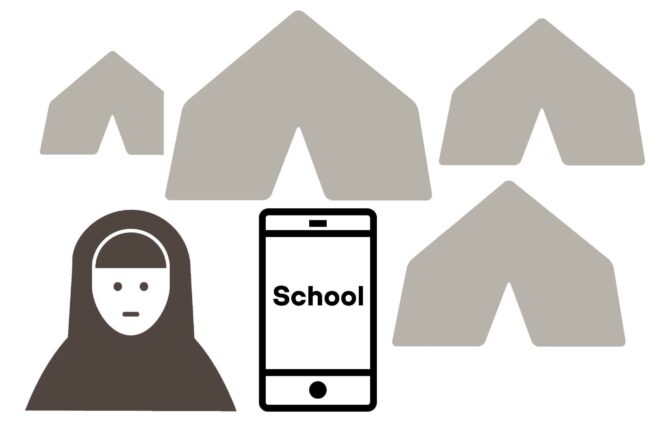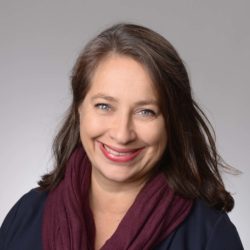

The distance school to al-Hawl camp in Syria took place via WhatsApp messages. The first messages were sent to the mothers. Photo: Kulkuri/Ilkka Kärkkäinen
The distance school to al-Hawl camp in Syria took place via WhatsApp messages. The first messages were sent to the mothers. Photo: Kulkuri/Ilkka Kärkkäinen
Ilona Taimela taught Finnish children who were living in the Al-Hol camp in Syria. It was also important to support the children’s parents in a situation where families lacked all safety nets.
Ilona Taimela spent a year teaching Finnish children and adolescents living in the Al-Hol (Al-Hawl) camp in Syria. Distance learning started in May 2020 and took place via WhatsApp messages.
The first message to the camp was for the children’s mothers. The message asked whether mothers would be interested in having their children attend a distance learning school from Finland.
“Some of the mothers got excited straight away, and others signed up their children later.”
All messages concerning the education went through the mothers.
The first message of the day was always sent by Taimela at nine in the morning. She wished everyone “good morning” and described the weather in her home town. This message was followed by the day’s schoolwork, which the mothers passed on to their children.
Skills for motherhood
The Al-Hol distance learning school was run by the Finnish Lifelong Learning Foundation’s Kulkuri School of Distance Education. The aim was to create a routine for the children’s days and give them something meaningful to do. The bigger goal was also to facilitate integration if and when the families are successfully repatriated to Finland.
Taimela planned and implemented the lessons together with another teacher. 23 children and adolescents aged between the ages of 2 and 19 participated. The teaching was in Finnish.
“It’s important to find the answers yourself. That’s how learners become confident in their skills.
For the youngest children, the most important thing was to build up their vocabulary. In addition to Finnish, the older ones studied geography, history, mathematics and English. The mothers conveyed exercises and answers between teachers and older pupils, and helped the youngest with their exercises.
The predominant language spoken in the Al-Hol camp is Arabic. Because the teaching was in Finnish, some mothers began to speak Finnish to their children in everyday life. For the youngest mothers, distance learning is all about parenting.
“They have become mothers in an environment where they have had no support networks. The mothers could ask us about their children’s behaviour. The mothers of young children were surprised when their children imitated their speech. We told them this was a good thing.”
The teachers also told the mothers that it was up to parents to tell their children about the world, so that they could learn new words. By helping with schoolwork, the mothers also learned how to explain words to their children. Some of the children had always lived in a tent and did not know what the word ‘house’, for example, meant.
Resilience in learning
Sometimes the pupils practised their letters by drawing them in the sand outside the tent. Sometimes, the assigned task was to observe which things in the camp were inanimate and which were animate. According to Taimela, inquiry-based learning strengthens resilience.
“It’s important to find the answers yourself. That’s how learners become confident in their skills.”

Ilona Taimela, with another teacher, planned and implemented the lessons for the Al-Hol distance school.
Taimela has 30 years of experience in teaching. She has been a primary school teacher, school counsellor, subject teacher, member of a school management team, educational consultant and researcher. Some of the work has been international, and Taimela is familiar with working with refugees and immigrants.
She defines resilience as the ability to change.
When you understand and accept that change is a constant in life, you have strong resilience. Then you can find pleasure in learning new things. Being open-minded should be supported at school.
Sometimes going backwards is needed
Taimela stresses that keeping up pupils’ motivation requires sensitivity on the part of teachers. Every week, the people at Al-Hol were asked for feedback on the exercises, and the plans were changed based on this.
“If the exercises were too difficult, we couldn’t go forward and had to go backwards.”
“Lack of sensitivity leads to children and young people not accepting education.”
Taking the children’s own interests into account was essential. One pupil was not enthusiastic about the geography and history exercises, but said he was interested in large animals. The teachers started sending him exercises involving tigers or elephants.
“Lack of sensitivity leads to children and young people not accepting education.”
Motivation to study is always strengthened by learning something new. At Al-Hol, a 6-year-old child learned to read stories in Finnish. The older ones started to learn double consonants and word inflections when writing Finnish.
Taimela hopes that the experience also gave hope to the mothers of the pupils.
“Hope is the cornerstone of resilience, because being open to new things requires hope.”
Secret distance learning
Studying and telephones are forbidden at the Al-Hol camp, so the children had to study in secret.
If the soldiers guarding the camp were around, phones and schoolwork had to be hidden. All the tasks had to be planned so that no one got into trouble because of them.
How distance education at al-Hol was organised:
- Al-Hol refugee camp is located in the north-eastern Syrian region of Rojava in the city of al-Hol. In January 2021, there were around 62,000 people living in the camp, most of them Iraqi and Syrian women and children.
- The Ministry for Foreign Affairs and the Ministry of Education and Culture were responsible for implementing the teaching. The Finnish Lifelong Learning Foundation’s Kulkuri School of Distance Education provided the service.
- The particular aim of the distance education was to strengthen the children’s basic skills in reading, writing and mathematics.
The children were given knowledge about Finnish culture, school, society and nature. - The development work is in line with the objectives set out in the UN Convention on the Rights of the Child.
Working with people in prison was new to Ilona Taimela. The experience reinforced ideas about what she had learned earlier in her career – including the importance of reciprocity between the teacher and pupils.
Taimela has been in challenging situations before. Once you have survived them, your confidence in your own ability to cope increases, she says.
The most difficult thing about teaching children living in Al-Hol was that you could not tell outsiders about the work.
“But I had confidence in myself that I was doing the right thing.”
The Finnish Lifelong Learning Foundation, Kvs, is the main publisher of Elm Magazine.
Author







